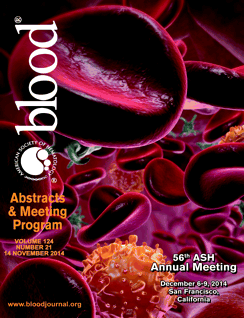Abstract
Background: Prognosis of relapsed/refractory acute lymphoblastic leukemia (ALL) in adults is dismal. CD22 is highly expressed in patients with B-ALL. Epratuzumab (hLL2) is a humanized monoclonal antibody targeting CD22 surface antigen. We performed a standard 3+3 phase 1 study to assess the feasibility, tolerability, and efficacy of a 90yttrium-labeled anti-CD22 epratuzumab tetraxetan (90Y-DOTA-hLL2) radioimmunotherapy (RIT) in adults with refractory/relapsed CD22+ B-ALL.
Methods: After premedication with corticosteroid, 90Y-DOTA-hLL2 was administered twice on days 1 and 8 (+2), successively at 2.5 (level 1), 5.0 (level 2), 7.5 (level 3), and 10.0 (level 4) mCi/m². The first two patients also received 4 infusions of DOTA-hLL2 360 mg/m²/day before the RIT. This “cold phase” was terminated after observing no efficacy and full saturation of the CD22 target on the leukemic cells. Minimal residual disease (MRD) was assessed either by flow cytometry or by RQ-PCR for BCR-ABL1 analyses in Philadelphia chromosome positive (Ph+) B-ALL patients. Dose-limiting toxicity (DLT) was defined as any non-reversible grade >3 non-hematological toxicity or grade 4 pancytopenia with hypocellular bone marrow lasting for >6 weeks. Maximum tolerated dose (MTD) was defined as the dose level at which 2 of 3 or 2 of 6 patients experienced a DLT. Dosimetry, organ distribution and elimination of the radiotracer were studied between the two RIT infusions in all but one patient, using whole-body scintigraphy recorded after 111Indium-epratuzumab tetraxetan injection and blood pharmacokinetics. Patients were evaluated for response between 4 and 6 weeks following the first infusion of RIT.
Findings: Between October 2011 and June 2014, 20 patients were enrolled. Three patients were not considered for analyses because of disease progression (n=2) or persistent non-blastic pancytopenia (n=1) before RIT. Overall, 17 cases were treated (5 at level 1 including 2 previously treated with the cold phase, 3 at level 2, 3 at level 3, and 6 at level 4). There were 10 males and 7 females with a median age of 62 years (range: 27-77). Two patients had primary refractory B-ALL; 10, 3 and 2 were in first, second or third relapse, respectively. Median percentage of blasts in the bone marrow was 75%. Karyotypes were as follows: Ph+ B-ALL n=6, complex n=3, MLL rearrangement n=1, hyperdiploidy n=1, hypodiploidy n=1, near-triploidy n=1, del4q (+ikaros mutation) n=1, normal (but ikaros mutation) n=1, and unknown n=2. Four patients were previously allotransplanted. Median interval between diagnosis and RIT was 16.5 months.
Five patients presented immediate infusion reactions (3 grade 1, 1 grade 2 and 1 grade 3 in a patient with a previous history of severe allergic reactions) after the first RIT infusion, but received the second infusions without toxicities. All examined patients showed expected uptake of the radiotracer on potential disease sites (blood, spleen, liver, and bone marrow). No response was seen at levels 1 and 3. One molecular complete response was documented at level 2 (54-year old woman in third relapse of Ph+ B-ALL). At level 4, 2 patients achieved complete remissions (1 Ph+ ALL and 1 Ph- ALL), while all 6 cases presented with grade 4 hematologic toxicity. One DLT was documented at level 4 (non-blastic pancytopenia lasting 8 weeks), but MTD was not reached. Two patients in response received a second RIT cycle. Currently, only one non-responder is alive, while 2 of 3 responders are alive. One relapsed at 1 year and died of progression (level 2), while the two remaining are in persistent CR at 6 months post RIT, with low positive MRD.
Interpretation: 90Y-DOTA-hLL2 RIT is well-tolerated and induced complete remissions even in heavily pre-treated CD22+ relapsed/refractory B-ALL patients, thus appearing to be a promising targeted therapy for CD22+ B-ALL. We recommend the dose of 10 mCi/m² given twice, one week apart/cycle, for phase 2 studies. The trial is registered at http://clinicaltrials.gov/ct no.NCT01354457. Funding: Immunomedics, Inc.
Goldenberg:immunomedics: Employment. Wegener:immunomedics: Employment.
Author notes
Asterisk with author names denotes non-ASH members.

